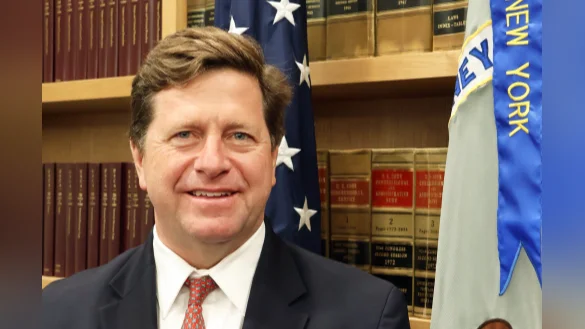Jay Clayton, U.S. Attorney for the Southern District of New York | Department of Justice
Do Hyeong Kwon, co-founder and former CEO of Terraform Labs, has pleaded guilty to one count of conspiring to commit commodities fraud, securities fraud, and wire fraud, as well as one count of committing wire fraud. The charges stem from fraudulent activities connected to Terraform Labs’ operations and its blockchain-based financial products. The plea was entered before U.S. District Judge Paul A. Engelmayer in the Southern District of New York.
U.S. Attorney Jay Clayton commented on the case: “Do Kwon used the technological promise and investment euphoria around cryptocurrency to commit one of the largest frauds in history. Kwon attracted tens of billions in funds to Terraform’s ecosystem by promising a self-stabilizing stablecoin. By the time the markets discovered the ecosystem was unstable, it was too late: the system collapsed, and investors around the world suffered billions in losses. Kwon’s plea represents an important milestone in this Office’s continuing efforts to bring integrity and accountability to the digital asset markets. It would not have been possible without the dedicated work of our law enforcement partners at the FBI and the assistance of our allies abroad.”
According to court documents and public filings, Terraform Labs was founded by Kwon in 2018 with claims that its proprietary blockchain technology could offer decentralized finance services such as cryptocurrencies, payment systems, a stock market platform, and a savings bank. The company issued algorithmic stablecoins through what it called the Terra Protocol, asserting these coins would maintain value even under changing market conditions.
Terraform announced its dollar-pegged stablecoin TerraUSD (UST) in September 2020, promoting that each UST could always be exchanged for $1 worth of LUNA—its native token—and vice versa. Over time, several platforms were launched under Terraform or affiliated entities:
- Chai: a Korean payment platform claimed to use Terra blockchain for transactions.
- Mirror Protocol: allowed trading synthetic versions of financial assets using Terra blockchain.
- Anchor Protocol: offered borrowing/lending services for UST with returns up to 20% annually.
- Luna Foundation Guard (LFG): managed financial reserves meant to support UST’s dollar peg.
Kwon secured investments from firms in multiple countries based on these representations. However, investigations revealed multiple misrepresentations:
- He falsely promoted Terra Protocol's ability to maintain UST’s value through algorithms while secretly arranging with a high-frequency trading firm to prop up UST’s price after it lost its peg.
- He misrepresented LFG as independently governed when he actually controlled both LFG and Terraform; he also diverted significant assets from LFG.
- He claimed Mirror Protocol operated independently while maintaining secret control over it and manipulating asset prices using bots.
- He said Chai processed transactions via Terra blockchain when traditional networks were used instead.
- He misrepresented how so-called Genesis Stablecoins were reserved but instead used large amounts for fake transactions or manipulation.
At its peak in spring 2022, UST and LUNA appeared valued at more than $50 billion—a rise driven by misleading statements about their stability and utility. In May 2022, both tokens crashed following another loss of UST's peg; investors reportedly lost over $40 billion.
Following these events, Kwon distributed a misleading audit report attempting to cover up wrongdoing.
On March 23, 2023, Kwon was arrested in Europe using false identification; he was extradited from Montenegro on December 31, 2024 after requests from U.S. authorities.
Kwon has agreed as part of his plea deal to forfeit more than $19 million gained from his schemes—including interests related to Terraform Lab’s cryptocurrencies—and faces up to 25 years imprisonment upon sentencing scheduled for December 11, 2025.
The investigation involved cooperation among several agencies including multiple divisions within the FBI and authorities from Montenegro.
Mr. Clayton praised law enforcement partners’ work: “Mr. Clayton praised the outstanding work of the Federal Bureau of Investigation (“FBI”), FBI’s Virtual Assets Unit, FBI’s Economic Crimes Unit, FBI’s International Operations Division and Legal Attaché office covering Montenegro, the Ministry of Justice of the Republic of Montenegro, the Ministry of Interior of the Republic of Montenegro, the Montenegro Supreme State Prosecutor's Office, and the Montenegro Special State Prosecutor's Office. Mr. Clayton also gave special thanks to the Department of Justice’s Office of International Affairs for securing the extradition.”
The prosecution is being handled by Assistant U.S. Attorneys Marguerite B. Colson, Sarah Mortazavi, Kimberly Ravener, and Andrew Thomas under supervision from this Office’s Securities and Commodities Fraud Task Force.




